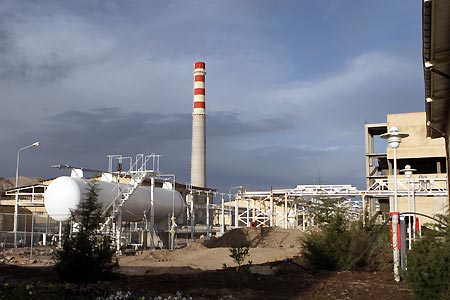Iran's Majlis (parliament) is going to play a major role in the country's future nuclear negotiations as Speaker Ali Larijani vowed Sunday that the lawmakers would supervise the talks.
 |
|
Photo taken on April 9, 2009 shows Iran's nuclear fuel manufacturing plant in Isfahan, Iran. Iranian President Mahmoud Ahmadinejad inaugurated its first nuclear fuel manufacturing plant here on Thursday.[Xinhua] |
The parliament would only authorize those nuclear talks which are carried out "within the legislative body's framework," and "only if they are conducted within the framework of the Majlis resolutions," local Press TV website quoted Larijani as saying.
By supervising the process of the negotiations, Majlis intends to practice authority over the issue which is believed by Iranian officials that has turned in favor of the nation's "inalienable nuclear rights".
The purpose of the Majlis supervision seems to safeguard the "great achievements" Iran indebted to President Mahmoud Ahmadinejad's "resistance" in the long-run nuclear standoff, said observers.
After a recent bitter debate between the parliament and the president over the country's budget, Larijani, on Sunday's formal session of Majlis, hailed Ahmadinejad's "resistance" over nuclear issue, the official IRNA news agency reported.
Referring implicitly to the country's first nuclear fuel manufacturing plant that was inaugurated on Thursday and to some other achievements, Larijani admired the president's resistance over the nuclear issue and defense of the nation's right in this matter, IRNA added.
Iranian officials also believe that the country has surpassed the nuclear fuel producing cycle, strengthened the infrastructure for the nuclear technology and acquired the nuclear technology know-how which, according to the speaker himself, are irreversible.
On the upcoming joint talks with UN Security Council permanent members -- France, Britain, Russia, China and the United States --plus Germany (G5+1), Larijani advised the world powers to concentrate on Iran's "inalienable nuclear rights" in the potential negotiations.
As a precondition for the talks, Larijani, however, rejected proposals made by certain members of the G5+1 to adopt intrusive inspections on Iran's nuclear program.
"Such proposals had no legal basis," added Larijani.
On Thursday, Iranian President Mahmoud Ahmadinejad said in the central city of Isfahan that the country would welcome "honest" and "fair" talks based on mutual respect.
US State Department acting spokesman Robert Wood had said on Wednesday that the G5+1 had invited Iran to join direct talks on its nuclear program.
The United States and other Western countries claim that Iran intends to secretly develop nuclear weapons. The UN Security Council also requires Iran to suspend its uranium enrichment activity.
Iran, however, insists that its nuclear plan is only for peaceful purposes, vowing to continue its uranium enrichment activity despite pressure and sanctions from Western countries.
(Xinhua News Agency April 13, 2009)